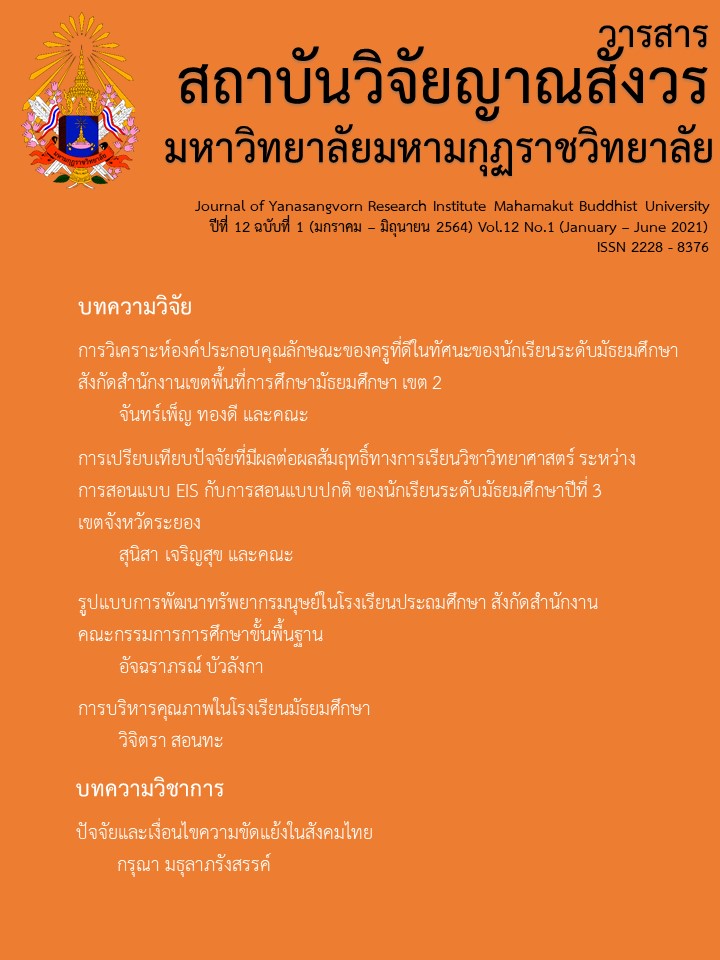PROTOTYPE DEVELOPMENT OF GROUP COUNSELLING BASED ON SATIR MODEL FOR CARE GIVERS OF INTELLECTUAL DISABILITIES CHILDREN
Main Article Content
Abstract
The Objectives of this study are to study the effects of group counseling based on Satir model and to compare the pre-post levels of stress of care giver of intellectual disabilities children. The research design was a pretest-posttest control group design. The samples were randomly selected from 27 caregiver of children with intellectual disabilities who 6-15 years old, recruited using the inclusion criteria. There were 13 participants allocated to experimental group and 14 to control group. The experiment group participated in the group counseling based on Satir model program by the researcher as the group leader. The activities comprised 8 session, each lasting 90-120 minutes, one a week for 8 weeks. The control group received usual care services. The research instruments were the Stress test (ST-20) developed by department of mental health. Descriptive statistics, chi-square, paired t-test and independent t-test were used in data analysis. The effects of the program were revealed by the results of this study. The post-test means scores of stresses among the caregivers of intellectual disabilities children in the experimental group was significantly lower than the pre-test score (p<.05) (p=.014). Besides, in the family function dimension of two groups were significantly difference at .05 level (p=.003) after program. As a result, group counselling based on Satir model demonstrated positive effect to stress of care giver of children with intellectual disability
Article Details
References
Hastings, R. P., & Beck, A. (2004). Practitioner Review: Stress intervention for parents of children with intellectual disabilities. Journal of Child Psychology and Psychiatry, 45(8), 1338-1349. doi:10.1111/j.1469-7610.2004.00357.
National Academies of Sciences, E., and Medicine. (2015). Mental Disorders and Disabilities Among Low-Income Children(T. F. B. a. J. T. Wu. Ed.).Washington DC: National Academies of Sciences, Engineering and Medicine. Retrieved September 16,2019 from https://www.ncbi.nlm.nih.gov/books/NBK332882
กรรวิภาร์ หงษ์งาม.(2546). ผลของการให้คำปรึกษาแบบกลุ่มต่อความเครียดของผู้ปกครองเด็กออทิสติก(ศิลปะศาสตร์มหาบัณฑิต(งานบริการฟื้นฟูสมรรถภาพคนพิการ)). มหาวิทยาลัยมหิดล, นครปฐม.
สดใส คุ้มทรัพย์อนันต์. (2561). กลุ่มครอบครัวบำบัดแนวแซทเทียร์ (Family Group Therapy) (พิมพ์ ครั้งที่ 1).กรุงเทพมหานคร: สำนักพิมพ์มหาวิทยาลัยธรรมศาสตร์.
สมชาย จักรพันธุ์ และคณะ. (2542). การพัฒนาแบบประเมินและวิเคราะห์ความเครียดด้วยตนเอง สำหรับประชาชนไทยด้วยคอมพิวเตอร์, (รายงานผลการวิจัย). นนทบุรี:กรมสุขภาพจิต.


